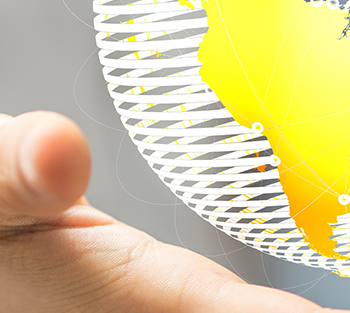This December covered both significant in the field of geopolitics events in Russia: the President’s message to Federal Assembly and annual press conference of Vladimir Putin[1]. Message to Federal Assembly was timed to the 20th Year Anniversary of the Constitution of Russian Federation, which was celebrated on December 12, 2013, and preceded marathon press-conference with a week time difference between them. Although President’s Message to Federal Assembly seems absolutely uppermost over the entire content related to foreign politics and geopolitical situation as well-composed thesis; interactive communication within press-conference played important subsidiary role as interpretation of concepts presented earlier. Besides supplementing each other, two documents (if we look at them from reader position[2]) accumulate and articulate numerous bents, aspirations and trends which have been reflected in different kinds of informational resources from articles and declarations up to political practice throughout the year of 2013.

Elena S. Arlyapova:"In the light of Russian-American relationships, V. Putin’s remark on case of Snowden seemed to be amiss. Taking out of context all factual side (nor personal contacts neither operative work), it is worthy to notice attitude and interpretation. The speaker avoided common demonization of the ANS and its activity, reminded the audience about permanent threat of international terrorism, fighting with which has been still the main goal of the agency. It appears that in current conditions of international politics anti-terrorism activity remains one of very few areas where minimum to none splits between leading actors take place; thereby it should be highlighted as one of the most stable component of bilateral cooperation."
Over an on-going discussion inside and outside Russia upon high correlation between country economic development and public introduction of international contradictions (which may allow to write off slips in internal politics on “external enemies’” account), it is very relevant to mention demonstrated understanding and assurance, that major reasons for economic growth impairment are domestic. This applies, in particular, to labor productivity, where our lag is still noticeable, while with Gross Domestic Product indicators Russia has successfully joined a leading group of five.
No less related to geopolitics turned out to be a question about “a politician #2” in Russia (assuming Mr. Putin to hold the number 1) in the context of possible successor. Naming the whole list of potential candidates, the President started with Gennady Zyuganov, Russian Communist party leader, and mentioned en passant his all fours with Zyuganov’s views on international politics in the light of national interests of Russia. This stimulates to take a closer look at them. The most recent article by Mr. Zyuganov with this target focus has a speaking name: “Only resolute change of course of the country will return its bygone status of Great Power to Russia”[3]. Among the rest, it brings up issues of military transit to Kaliningrad region, PRO in Eastern Europe, Livia and Syria crisis (as an attempt to force Russia and China out of the Mediterranean), Snowden case. General observations cover lack of mutuality in newly-made partnerships, expansionist policy of the US and Great Britain, common trend to weaken role of national states, to seek hard for access to oil and gas fields, to make obstacles for local business when it comes out and starts operating on international market.
December messages had undoubtedly confirmed sharing at least some of the ideas. Although even superficial content analysis allows to see similar premises in underlying of presidential rhetoric since the very end of 2011 throughout 2012 and 2013. Declaration of new integration project in resonance article by V. Putin[4] in October 2011 had also marked a rather sharp turn in Russian international politics. Statements of 2012 sequentially continued following newly worked-out strategy of “free-running and independent[5]” foreign policy. Speeches of December 2013 stood by the handpicked vector. General geopolitical situation was evaluated in the light of growing competition and collisions in the field of international politics what was no harder than growing “international tension and vagueness” last year[6]. This time there seemed to be less regrets for missing opportunities in sense of ambitious aims Russia and Europe could but failed to set and to achieve together[7], and more on the specific goals which Russian-West cooperation had succeeded in. Vladimir Putin was pronouncedly insistent in sharing recent progress in Iranian and Syrian cases between all leading actors involved in regulation process. He named at least four of them including Russia in that context: the US, the EU and China. Later on Iran was also mentioned as one sine qua non. All this together sounded both as a matter of courtesy and as a signal of readiness to cooperate in obtaining results which have been considered non-conflicting to national interests of Russia.
No less related to geopolitics turned out to be a question about “a politician #2” in Russia (assuming Mr. Putin to hold the number 1) in the context of possible successor. Naming the whole list of potential candidates, the President started with Gennady Zyuganov, Russian Communist party leader, and mentioned en passant his all fours with Zyuganov’s views on international politics in the light of national interests of Russia.
Offered format was especially important since some coercive measures were not escaped too: for instance, when answering a question on German tabloid “Bild” leakage upon placement Russian tactical missile complex “Iskander-M” in the area of Kalinigrad[8], which had evoked widespread reaction of Western and allied mass-media[9]. It is relevant to cite V. Putin’s note that decision has not been made yet, as well as his remark on Russian weapons potential, which is not limited to the preventive character only. Of course, it comes together with PRO-system located in Europe, what is considered to be a threat to Russian nuclear potential. Russian officials had made valiant effort to work out issues, declared to underlie PRO placement, in particular, referring the Iranian problem. However, it had caused no reaction other than indifference from West community. This foils all undertaken efforts in sense of National security. The President gave clear definition of Russian security concerns backbone: it is a presence of nuclear weapon in Europe with no control from any of European countries. Stepping back from official rhetoric, the problem of international prestige and positioning should not be ignored as well; a dissent upon PRO appears even more political than pure military barrier in Russia-West cooperation.
Despite involving strength moments both speeches were obviously free from anti-Americanism, the talk of the town for all kind of media and some analytics[10]. V. Putin did not go beyond general notes upon current misunderstanding between Russia and “someone” likely to dictate their will on external and internal politics of another state with no exception for such delicate scope as moral and values and to a smaller extent religion. This became his central point for CNN representative’s question on the President’s view of values and religion stressing criticism of ones outgoing from the West community. Although Message to Federal Assembly had some evaluative wording, such as an “equivalence of good and evil” as applied to another states. Within cultural wealth part comes Putin’s shift from citing Ivan Il’in to Nikolay Berdyaev, denoted by many political analysts.
In the light of Russian-American relationships, V. Putin’s remark on case of Snowden seemed to be amiss. Taking out of context all factual side (nor personal contacts neither operative work), it is worthy to notice attitude and interpretation. The speaker avoided common demonization of the ANS and its activity, reminded the audience about permanent threat of international terrorism, fighting with which has been still the main goal of the agency. It appears that in current conditions of international politics anti-terrorism activity remains one of very few areas where minimum to none splits between leading actors take place; thereby it should be highlighted as one of the most stable component of bilateral cooperation. Its worth primarily consists of conserved opportunity to build-up a positive agenda based on shared guiding lines and aspiration. Sometimes it looks like both sides cautiously keep this residuary platform for immediate claiming when needed. Fight against terrorism and drugs will form leading directions for Russia when presiding G-8 next year.
Interaction on Post-Soviet area contained a separate question alignment. Particular attention was predictably dedicated to Ukraine.
Interaction on Post-Soviet area contained a separate question alignment. Particular attention was predictably dedicated to Ukraine. Swiftness of situation development called forth dynamics in concerned rhetoric from neutral reference to Ukraine’s joining single agreements within the Custom Union, its discussant and observer status into illumination of certain fiscal and political actions undertaken by Russia towards ex-Soviet republic. Marked progress with Georgia, longing for profound, final normalization of relationship, roadmaps for Kirgizstan and Armenia to join the Custom Union – all this has been an evidence of adherence and coherence of Russian foreign policy to the idea of integration within Post-Soviet space. As many times before Vladimir Putin underlined the basis of the Eurasian integration project: they are “equal rights and real economic concerns”. He stressed again not to oppose building Eurasian and functioning European Unions. There is a whole list of paused and on-going cooperative projects between European Union and Custom Union (e.g. free trade zone negotiations), between Russia and EU (e.g. New Base Agreement). Commenting results of Russian entry into WTO (World Trade Organization) the President, although giving strongly positive feedback to the occurrence), noted numerous obstacles thrown in Russia’s way to European market, especially in energy trade[11].
Finally, ambitious enough sounded declared U-turn towards to the Pacific Ocean, in addition combined with shifting priorities in domestic politics. It should be mentioned that recent official visits (South Korea, Vietnam) speak for the start of practical realization of the concept. Dynamic development of Russia’s eastern territories beside all-sufficient value is also called to provide additional instruments for active foreign policy of Russian Federation.
[1] Here and further reference to the President Message to the Federal Assembly on 12.12.2013 (video)// http://www.youtube.com/watch?v=s7DCtuoHUCQ; to the President Press-Conference on 19.12.2013 (video)// http://www.1tv.ru/projects/ si5760/fi27825.
[2] Poslanie Presidenta RF Vladimira Putina Federal’nomu Sobraniyu// Rossijskaya gazeta. 2013, 13 dekabrya [Послание Президента РФ Владимира Путина Федеральному Собранию// Российская газета. 2013, 13 декабря].
[3] Zyuganov G. A. Tolko reshitelnaya smena kursa strany vernet Rossii ee biloy status velikoi derzhavi// 20.08.2013 http://kprf.ru/party-live/cknews/121948.html [Зюганов Г. А. Только решительная смена курса страны вернет России ее былой статус великой державы// 20.08.2013 http://kprf.ru/party-live/cknews/121948.html].
[4] Putin V. Noviy integrazionny proekt dlya Eurasii – buduschee, kotoroe rozhdaetsya segodnya// Izvestia. 2011, 4 oktyabrya [Путин В. Новый интеграционный проект для Евразии – будущее, которое рождается сегодня// Известия. 2011, 4 октября].
[5] Putin V. Vystuplenie na Soveschanii poslov I postoyannyh predstavitelei RF pri mezhdunarodnyh organizaziah. Moskva, 9 iulya 2012 goda// Mezhdunarodnya zhizn. 2012. #7. S. 4 [Путин В. Выступление на Совещании послов и постоянных представителей РФ при международных организациях. Москва, 9 июля 2012 года// Международная жизнь. 2012. №7. С. 4].
[6] Ibid. P. 2.
[7] Ibid. P.6.
[8] Putin stationiert Raketen fur Atomsprengkopfe// Bild. 2013, 14 December; Putin stationiert Raketen an EU-Grenze// Bild. 2013, 17 December.
[9] Moscow: missiles in western Russia legitimate// Miami Herald. 2013, 16 December; Russian missile move sparks concern among NATO countries// Al Jazeera America. 2013, 16 December; etc.
[10] The Kremlin new anti-Americanism// The Economist (blog Russian Politics). 2013, 30 June; Putin’s anti-American campaign// Open Democracy Russia. Post-Soviet World. 2012, 02 March; Dale H. From Russia with Hate: Anti-Americanism Rampant in Putin’s Kremlin// Heritage Foundation. 2012. 23 April. http://blog.heritage.org/2012 /04/23/from-russia-with-hate-anti-americanism-rampant-in-putins-kremlin/; Cohen A., Dale H. Russian Anti-Americanism: A Priority Target for U.S. Public Diplomacy// Heritage Foundation Backgrounder No. 2373, February 24, 2010; Bohm M. The Jackals Scavenging Among Us// Moscow Times. 2007, 14 December 14; Cohen A. How the US should deal with Putin’s Russia// Heritage Foundation Backgrounder No. 3530, March 7, 2012; etc.
[11] What is true issue of a day in the Balkans right now. Countries involved in the “South Stream” project are testing in practice severity of the pressure which the European Union is able to put upon its members and associates, who are not ready to take to complete dictation.


